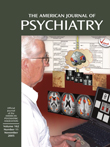Association of Resolution of Major Depression With Increased Natural Killer Cell Activity Among HIV-Seropositive Women
Abstract
OBJECTIVE: Depression is a potential risk factor for morbidity and mortality among patients with numerous medical conditions, including HIV disease, and it is also associated with decrements in immune function, such as natural killer (NK) cell activity. This study examined whether improvements in the diagnostic status of major depression are related to increases in NK cell activity among HIV-seropositive women. METHOD: HIV-seropositive women were recruited as part of a longitudinal cohort study and underwent comprehensive medical and psychiatric evaluations during a 2-year period. Fifty-seven women had complete NK cell activity and depression data measured at two time points and were examined for associations between changes in depression status and alterations in NK cell activity over time. RESULTS: Among the 57 HIV-seropositive women, improvements in the diagnostic status of depression and decreases in scores on the 17-item Hamilton Depression Rating Scale were significantly associated with increases in NK cell activity over time, as measured in lytic units. Eleven women (19.3%) had a major depression diagnosis that resolved over time, and this group also had a significant increase in cell activity measured in lytic units during this period. CONCLUSIONS: This study suggests that depression may impair certain aspects of innate cellular immunity relevant to delaying the progression of HIV disease and that these alterations are reversible with the resolution of a depressive episode. These findings support an examination of NK cell activity in assessments of the relationship between depression and morbidity and mortality in HIV disease.



